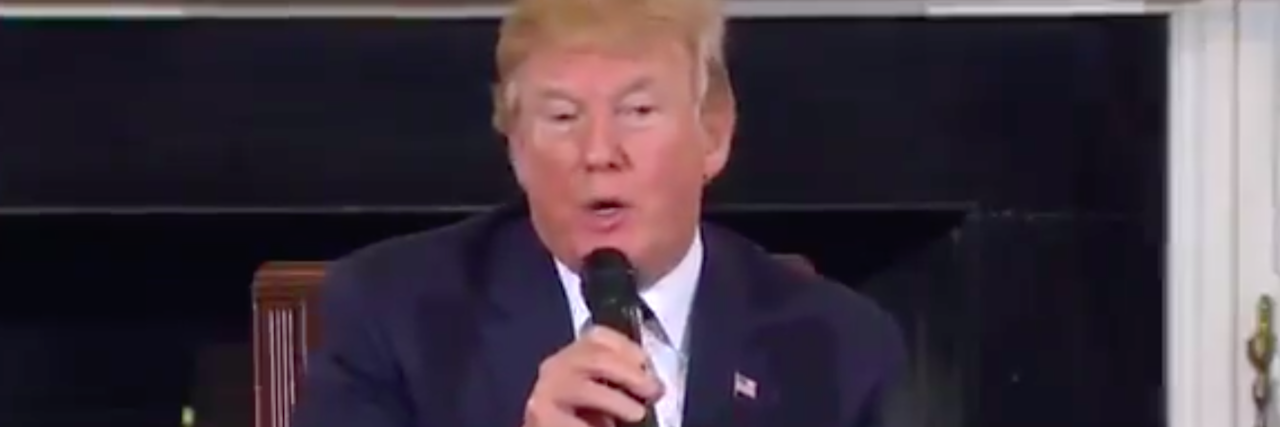On Wednesday, President Donald Trump hosted a listening session with students who survived the shooting at Marjory Stoneman Douglas High School in Parkland, Florida last week.
The shooting took 17 lives, and students who survived have been active on both social media and in the press urging politicians to enact policies that will prevent future mass shootings.
Students from Marjory Stoneman Douglas High School, their parents, administrators, survivors of other school shootings and the mayor of Parkland joined the president, Vice President Mike Pence and Secretary of Education Betsy DeVos. Those invited expressed their grief, offered possible solutions and urged the country to come together.
Topics, like arming teachers with firearms and providing more expansive background checks before gun ownership, were discussed — but President Trump also said a lack of mental institutions in our country makes it hard for law enforcement to detain people who potentially pose a threat, but who haven’t committed a crime yet.
“You know, years ago we had mental hospitals, mental institutions, we had a lot of them, and a lot of them have closed. Some people thought it was a stigma, some people thought, frankly, the legislators thought it was too expensive. Today if you catch somebody they don’t know what to do with them,” Trump said. “He hasn’t committed the crime, but he may very well, and there’s no mental institution, there’s no place to bring them. We have that a lot.”
Trump: "Years ago, we had mental hospitals, institutions…& a lot of them have closed. Some people thought it was a stigma…today, if you catch somebody, they don't know what to do with him. He hasn't committed the crime, but he may very well & there's no mental institution." pic.twitter.com/ArasEYbcPB
— CBS News (@CBSNews) February 21, 2018
Deinstitutionalization — or the process of shutting down many state-run mental health institutions — began in the 1960s. While it was a way to cut government budgets, it was also in reaction to the often dehumanizing conditions in which those with a mental illness were held.
While the way deinstitutionalization was carried out is often linked to the country’s current homelessness crisis, Trump argued a lack of mental institutions means authorities “don’t know what to do” with someone they’ve deemed a threat.
Even if they caught this person, I’m being nice when I use the word ‘person,’ they probably wouldn’t have known what to do. They’re not going to put him in jail. So there’s no middle ground of having that institution, where you had trained people who could handle it, and do something about it and find out how sick he really is, because he is a sick guy, and he should have been nabbed a number of times, frankly.
In response to these remarks from the president, Nicole Hockley, who lost her son during the 2012 Sandy Hook shooting and attended the listening session, explained why she disagreed “mental institutions” were part of the solution.
I think it’s important to note that someone with a mental illness is highly unlikely to commit an act of violence. It’s a really, really small percentage, what we’re really dealing with here, it’s more of a lack of mental wellness. This is around anger and fear. And that’s not something you can diagnosis and put in mental health hospitals.
Hockly said it’s important to talk about getting more funding for mental health services, and added that suicide was the second leading cause of death among teenagers — and firearms the most lethal suicide method.
People on Twitter also responded to the president’s remarks.
Many mental institutions closed after the courts (in Wyatt v Stickney) recognized patients had a right to adequate treatment rather than just involuntary detention. There is no 'good old days" when it comes to institutionalized mental health care. https://t.co/ApM2sIMc7a
— Don Moynihan (@donmoyn) February 21, 2018
It's also important to understand that the mental institutions Trump seems to be referencing closed because research showed many more people could be treated in the community and conditions of the institutions often resulted in deterioration of the people who were housed there. https://t.co/jdBsBfWKkE
— Shannon Heffernan (@shannon_h) February 22, 2018
What terrifies me about Trump’s “solution” is that mental health institutions and mental health care in the United States are an absolute shitshow. If that’s his solution, he needs to improve the care that mentally ill people receive in these institutions.
— michael (@michaeloveaston) February 22, 2018
#StonemanDouglas #ParklandstudentsSpeak Trump suggest bringing back “Mental Institutions” because they were phased out due to a stigma [No actually is was because of Horrible Human Rights Abuses] and he supports concealed carry for the teachers.
— F. Vyan Walton (@Vyan1) February 21, 2018

